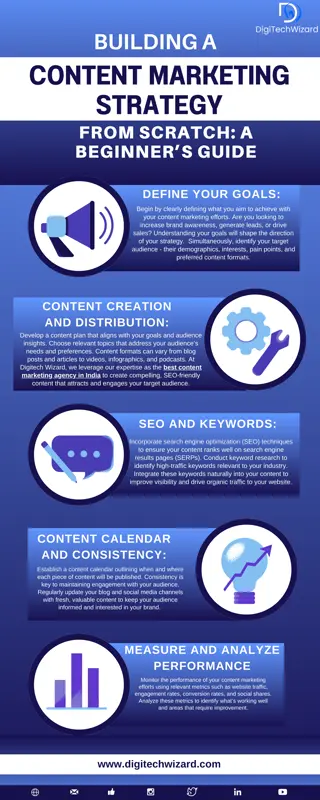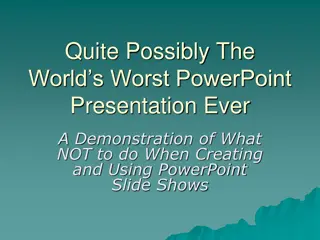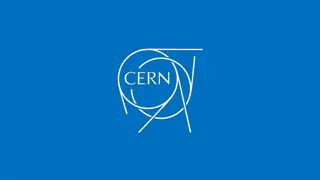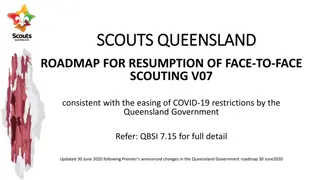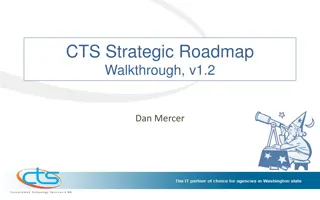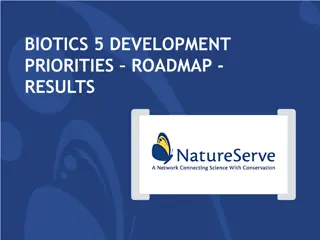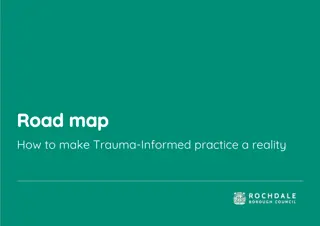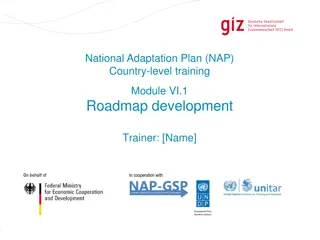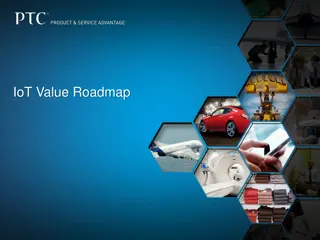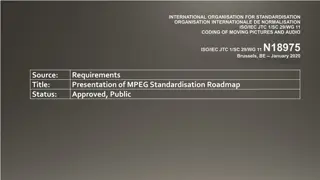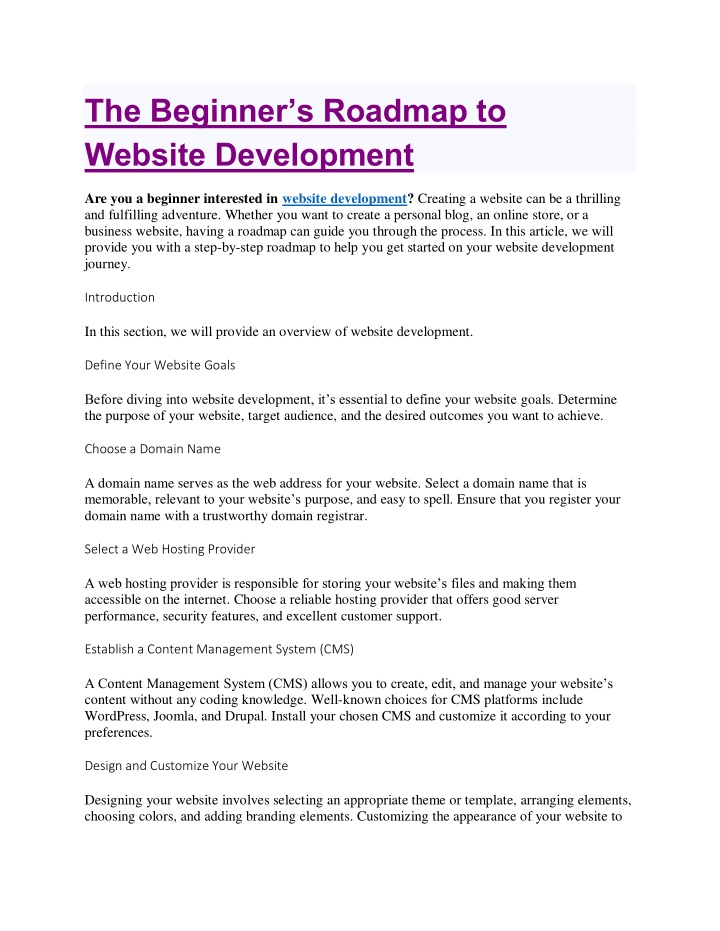
The Beginner’s Roadmap to Website Development
"The Beginneru2019s Roadmap to Website Development" is a simple guide for aspiring web developers, covering HTML, CSS, JavaScript, tools, frameworks, and best practices. With easy tips and advice, it helps beginners confidently create professional
Download Presentation

Please find below an Image/Link to download the presentation.
The content on the website is provided AS IS for your information and personal use only. It may not be sold, licensed, or shared on other websites without obtaining consent from the author. If you encounter any issues during the download, it is possible that the publisher has removed the file from their server.
You are allowed to download the files provided on this website for personal or commercial use, subject to the condition that they are used lawfully. All files are the property of their respective owners.
The content on the website is provided AS IS for your information and personal use only. It may not be sold, licensed, or shared on other websites without obtaining consent from the author.
E N D
Presentation Transcript
The Beginners Roadmap to Website Development Are you a beginner interested in website development? Creating a website can be a thrilling and fulfilling adventure. Whether you want to create a personal blog, an online store, or a business website, having a roadmap can guide you through the process. In this article, we will provide you with a step-by-step roadmap to help you get started on your website development journey. Introduction In this section, we will provide an overview of website development. Define Your Website Goals Before diving into website development, it s essential to define your website goals. Determine the purpose of your website, target audience, and the desired outcomes you want to achieve. Choose a Domain Name A domain name serves as the web address for your website. Select a domain name that is memorable, relevant to your website s purpose, and easy to spell. Ensure that you register your domain name with a trustworthy domain registrar. Select a Web Hosting Provider A web hosting provider is responsible for storing your website s files and making them accessible on the internet. Choose a reliable hosting provider that offers good server performance, security features, and excellent customer support. Establish a Content Management System (CMS) A Content Management System (CMS) allows you to create, edit, and manage your website s content without any coding knowledge. Well-known choices for CMS platforms include WordPress, Joomla, and Drupal. Install your chosen CMS and customize it according to your preferences. Design and Customize Your Website Designing your website involves selecting an appropriate theme or template, arranging elements, choosing colors, and adding branding elements. Customizing the appearance of your website to
align with your brand identity and provide a pleasant user experience is essential. Using engaging 2D art developmenttechniques can also enhance your website s visual appeal. Create Essential Pages Your website should have certain essential pages, including a homepage, about page, contact page, and any other relevant pages specific to your website s purpose. Craft compelling and informative content for each page. Add Functionality with Plugins and Extensions Extend the functionality of your website by installing plugins or extensions specific to your CMS. For example, if you have a WordPress website, you can install plugins for search engine optimization, security, contact forms, and social media integration. Integrating tools such as IoT app development solutions can also bring advanced features to your website. Enhance Your Website for Search Engines through Search Engine Optimization (SEO) Implementing SEO techniques will help your website rank higher in search engine results. Make sure to optimize your website s content, meta tags, headings, and images by incorporating relevant keywords. Improve site speed, create quality backlinks, and provide valuable content to attract organic traffic. You can also leverage digital marketing services to further boost your website s visibility. Ensure Mobile Responsiveness In today s mobile-centric world, it s crucial to ensure your website is responsive and displays correctly on different devices. Test your website s responsiveness on smartphones, tablets, and various screen sizes. Test and Debug Your Website Thoroughly test your website to identify and fix any issues or bugs. Check for broken links, compatibility across different browsers, and smooth functionality of interactive elements. Secure Your Website Website security is of utmost importance. Protect your website from potential threats by implementing security measures such as SSL certificates, regular backups, strong passwords, and security plugins. Using MR app development techniques can enhance user interaction while keeping the platform secure.
Launch Your Website Congratulations! It s time to launch your website. Double-check all the elements, ensure all links are working correctly, and make your website live for the world to see. Monitor and Maintain Your Website Website development is an ongoing process. Regularly monitor your website s performance, update plugins and themes, create backups, and regularly add fresh content to keep your visitors engaged. Conclusion Website development may seem daunting at first, but with a well-defined roadmap, you can confidently navigate through the process. Remember to define your goals, choose a domain name, select a reliable hosting provider, set up a CMS, design and customize your website, optimize for search engines, ensure mobile responsiveness, test and debug, secure your website, and finally, launch and maintain it. FAQ Q: Do I need coding skills to develop a website? No, you don t necessarily need coding skills to develop a website. Content Management Systems such as WordPress offer intuitive interfaces that enable you to construct websites without the need for coding knowledge. However, having basic knowledge of HTML, CSS, and JavaScript can be beneficial for customization and troubleshooting. Q. How long does it take to develop a website? The time required to develop a website depends on various factors, such as its complexity, the amount of content, and your familiarity with the tools. Simple websites can be created in a few days, while more complex ones may take weeks or even months to develop. Q: Is it possible to modify my website s design after it has been launched? Absolutely, you can alter your website s design even after its launch. Most Content Management Systems allow you to switch themes or templates easily. However, significant design changes may require additional customization and testing. Q: Are web development skills in demand? Yes, web development skills are in high demand as businesses and individuals increasingly rely on websites for various purposes. Having these skills can open up numerous job opportunities and freelance projects.
Q: What are some effective methods to increase traffic to my website? To drive traffic to your website, you can utilize various strategies such as search engine optimization (SEO), social media marketing, content marketing, email marketing, and paid advertising. It s essential to create high-quality content and promote your website through different channels. Q: How often should I update my website? Updating your website regularly is crucial to keep it relevant and engaging. Aim to update your content, add new features, and improve the user experience periodically. Consider creating a content calendar to plan and organize your updates effectively.

![[PDF⚡READ❤ONLINE] Zen Mind, Beginner's Mind: 50th Anniversary Edition](/thumb/20459/pdf-read-online-zen-mind-beginner-s-mind-50th-anniversary-edition.jpg)




